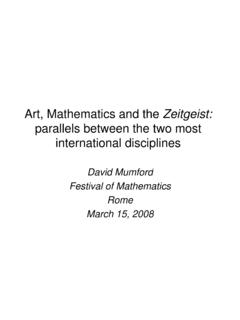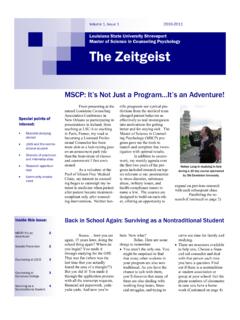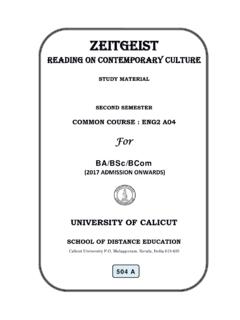Transcription of Creativity in Science: Chance, Logic, Genius, and Zeitgeist
1 Creativity in Science: Chance, logic , genius , and Zeitgeistbook by Dean Keith SimontonCreativity in ScienceWhat are common theories for understanding Creativity in science?ChanceLogicGeniusZeitgeistIs there a unified framework for understanding Creativity ?Chance "ideas emerge more by happy accident than by design"Unpredictable, chaotic, serendipitous nature of discoverpseudo-serendipitytrue serendipityNameDiscovery or InventionDateColumbusAmericas1492 DavyLaughing gas anesthesia1798 OerstedElectromagnetism1820 NobelDynamite1866 EdisonPhonograph1877 PasteurVaccination1878 RontgenX-rays1895 FlemingPenicillin1928 PlunkettTeflon1938de MaestralVelcro1948 LogicUsing reasoning and analysis to deduce empirical factsinevitability of resultsdiscovery programsexample: derivation of Planck's formula for black body radiation"Once a scientist masters the logic of science and the substance of a particular discipline, Creativity is assured.
2 "-Simonton" logic is the anatomy of thought."- John LockeGeniusHave unique abilities or disposition that set them apart from othersprolific nature of great scientistsmany important contributions from a small number of individualsLeonardo da VinciThomas EdisonGeorge Washington CarverFlint LockwoodZeitgeistZeitgeist - "spirit of the times", discoveries and inventions are the inevitable product of the sociocultural systemPrerequisite knowledgeSufficient number of investigators focused on a problememerging social needsinternal developmentsMultiplescalculusnatural selectionlaws of genetic inheritanceDiscussion QuestionsGet into groups of 3-4 people and discuss any of on the paradigms presented, what paradigm do you think is the most accurate? least accurate?
3 Why? the paradigms be merged or combined? If so, how? What parts of the paradigms might be mutually exclusive? do you understand the cause of scientific Creativity to be? If you were to make a unified theory of Creativity , what would it be?If time permits: When you are finished, take a minute or two to write down your thoughts based on the discussion in you personal Creativity archive.









